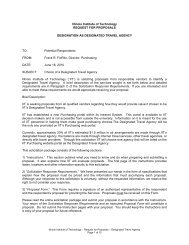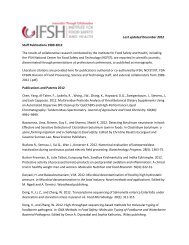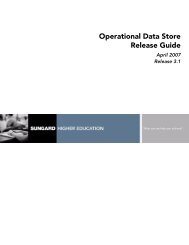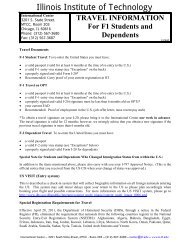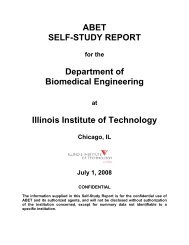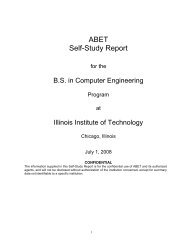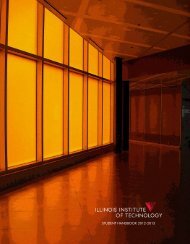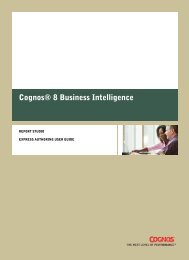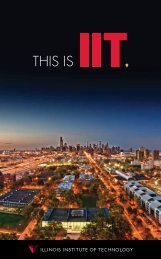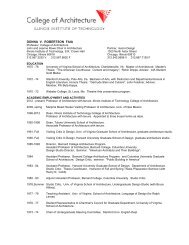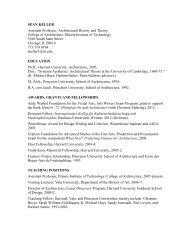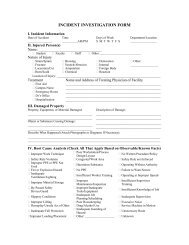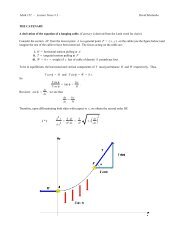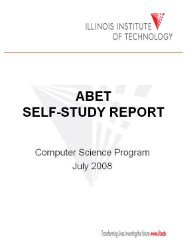Copyright & Disclaimer Information - Illinois Institute of Technology
Copyright & Disclaimer Information - Illinois Institute of Technology
Copyright & Disclaimer Information - Illinois Institute of Technology
You also want an ePaper? Increase the reach of your titles
YUMPU automatically turns print PDFs into web optimized ePapers that Google loves.
194<br />
Course Descriptions<br />
MATH 410<br />
Number Theory<br />
Divisibility, congruences, distribution<br />
<strong>of</strong> prime numbers, functions <strong>of</strong> number<br />
theory, diophantine equations,<br />
applications to encryption methods.<br />
Prerequisite: MATH 230 or consent<br />
<strong>of</strong> instructor. (3-0-3)<br />
MATH 420<br />
Geometry<br />
The course is focused on selected topics<br />
related to fundamental concepts<br />
and methods <strong>of</strong> Euclidean geometry<br />
in two and three dimensions and<br />
their applications with emphasis on<br />
various problem-solving strategies,<br />
geometric pro<strong>of</strong>, visualization, and<br />
interrelation <strong>of</strong> different areas <strong>of</strong><br />
mathematics. Prerequisite: Consent<br />
<strong>of</strong> instructor. (3-0-3)<br />
MATH 426<br />
Statistical Tools for Engineers<br />
Descriptive statistics and graphs,<br />
probability distributions, random<br />
sampling, independence, significance<br />
tests, design <strong>of</strong> experiments, regression,<br />
time-series analysis, statistical<br />
process control, introduction to multivariate<br />
analysis. Prerequisite:<br />
Junior standing. Same as CHE 426.<br />
Credit not given for both MATH 426<br />
and CHE 426. (3-0-3)<br />
MATH 430<br />
Applied Algebra<br />
Relations; modular arithmetic; group<br />
theory:symmetry, permutation,<br />
cyclic, and abelian groups; group<br />
structure: subgroups, cosets, homomorphisms,<br />
classification theorems;<br />
rings and fields. Applications to crystallography,<br />
cryptography, and checkdigit<br />
schemes. Prerequisite: MATH<br />
230 or MATH 332. (3-0-3)<br />
MATH 453<br />
Combinatorics<br />
Permutations and combinations;<br />
pigeonhole principle; inclusion-exclusion<br />
principle; recurrence relations<br />
and generating functions; enumeration<br />
under group action.<br />
Prerequisite: MATH 230 or consent<br />
<strong>of</strong> instructor. (3-0-3)<br />
<strong>Copyright</strong> & <strong>Disclaimer</strong> <strong>Information</strong>: <strong>Copyright</strong> © 1994, 1995, 1996, 1997, 1998, 1999, 2000, 2001, 2002, 2003, 2004, 2005, 2006, 2007. CollegeSource®, Inc. and Career Guidance Foundation. CollegeSource® digital catalogs are derivative works owned and copyrighted by CollegeSource®, Inc. and Career Guidance Foundation. Catalog content is owned and copyrighted by the appropriate school. While CollegeSource®, Inc. and Career Guidance Foundation provides information as a service to the public, copyright is retained on all digital catalogs.<br />
<strong>Copyright</strong> & <strong>Disclaimer</strong> <strong>Information</strong>: <strong>Copyright</strong> © 1994, 1995, 1996, 1997, 1998, 1999, 2000, 2001, 2002, 2003, 2004, 2005, 2006, 2007. CollegeSource®, Inc. and Career Guidance Foundation. CollegeSource® digital catalogs are derivative works owned and copyrighted by CollegeSource®, Inc. and Career Guidance Foundation. Catalog content is owned and copyrighted by the appropriate school. While CollegeSource®, Inc. and Career Guidance Foundation provides information as a service to the public, copyright is retained on all digital catalogs.<br />
MATH 454<br />
Graph Theory and Applications<br />
Graph theory is the study <strong>of</strong> systems<br />
<strong>of</strong> points with some <strong>of</strong> the pairs <strong>of</strong><br />
points joined by lines. Sample topics<br />
include: paths, cycles and trees; adjacency<br />
and connectivity; directed<br />
graphs; Hamiltonian and Eulerian<br />
graphs and digraphs; intersection<br />
graphs. Applications to the sciences<br />
(computer, life, physical, social) and<br />
engineering will be introduced<br />
throughout the course. Credit will not<br />
be granted for both MATH 454 and<br />
MATH 553. Prerequisite: MATH 230,<br />
MATH 251, or MATH 252. (3-0-3)<br />
MATH 461<br />
Fourier Series and Boundary-Value Problems<br />
Fourier series and integrals. The<br />
Laplace, heat, and wave equations:<br />
Solutions by separation <strong>of</strong> variables.<br />
D’Alembert’s solution <strong>of</strong> the wave<br />
equation. Boundary-value problems.<br />
Prerequisites: MATH 251, MATH 252.<br />
(3-0-3)<br />
MATH 471<br />
Numerical Methods<br />
Number representation; errors; iterative<br />
methods for nonlinear equations;<br />
polynomial interpolation; differentiation;<br />
integration; Gauss elimination.<br />
Prerequisites: MATH 251, MATH<br />
252. Corequisite: MATH 332 or<br />
MATH 333. (3-0-3)<br />
MATH 474<br />
Probability and Statistics<br />
Elementary probability theory including<br />
discrete and continuous distributions,<br />
sampling, estimation, confidence<br />
intervals, hypothesis testing and<br />
linear regression. Prerequisite:<br />
MATH 251. Credit not granted for both<br />
MATH 474 and MATH 475. (3-0-3)<br />
MATH 475<br />
Probability<br />
Elementary probability theory; combinatorics;<br />
random variables; discrete<br />
and continuous distributions; joint<br />
distributions and moments; transformations<br />
and convolution; basic theorems;<br />
simulation. Prerequisite: MATH<br />
251. Credit not granted for both MATH<br />
474 and MATH 475. (3-0-3)<br />
IIT Undergraduate Bulletin 2006–2008<br />
MATH 476<br />
Statistics<br />
Estimation theory; hypothesis tests;<br />
confidence intervals; goodness-<strong>of</strong>-fit<br />
tests; correlation and linear regression;<br />
analysis <strong>of</strong> variance; nonparametric<br />
methods. Prerequisite: MATH<br />
475. (3-0-3)<br />
MATH 477<br />
Numerical Linear Algebra<br />
Fundamentals <strong>of</strong> matrix theory; least<br />
squares problems; computer arithmetic;<br />
conditioning and stability;<br />
direct and iterative methods for linear<br />
systems; eigenvalue problems.<br />
Prerequisite: MATH 471 or consent<br />
<strong>of</strong> the instructor. (3-0-3)<br />
MATH 478<br />
Numerical Methods for Differential Equations<br />
Polynomial interpolation; numerical<br />
integration; numerical solution <strong>of</strong> initial<br />
value problems for ordinary differential<br />
equations by single and<br />
multi-step methods, Runge-Kutta,<br />
Predictor-Corrector; numerical solution<br />
<strong>of</strong> boundary value problems for<br />
ordinary differential equations by<br />
shooting method, finite differences<br />
and spectral methods. Prerequisite:<br />
MATH 471 or consent <strong>of</strong> instructor.<br />
(3-0-3)<br />
MATH 481<br />
Introduction to Stochastic Processes<br />
This is an introductory course in stochastic<br />
processes. Its purpose is to<br />
introduce students to a range <strong>of</strong> stochastic<br />
processes which are used as<br />
modeling tools in diverse fields <strong>of</strong><br />
applications, especially in the business<br />
applications. The course introduces<br />
the most fundamental ideas in<br />
the area <strong>of</strong> modeling and analysis <strong>of</strong><br />
real world phenomena in terms <strong>of</strong><br />
stochastic processes. The course covers<br />
different classes <strong>of</strong> Markov<br />
processes: discrete and continuoustime<br />
Markov chains, Brownian<br />
motion and diffusion processes. It<br />
also presents some aspects <strong>of</strong> stochastic<br />
calculus with emphasis on<br />
the application to financial modeling<br />
and financial engineering. Credit<br />
will not be granted for MATH 481<br />
and 542. Prerequisites: (MATH 332<br />
or MATH 333) and MATH 475 (3-0-3)



